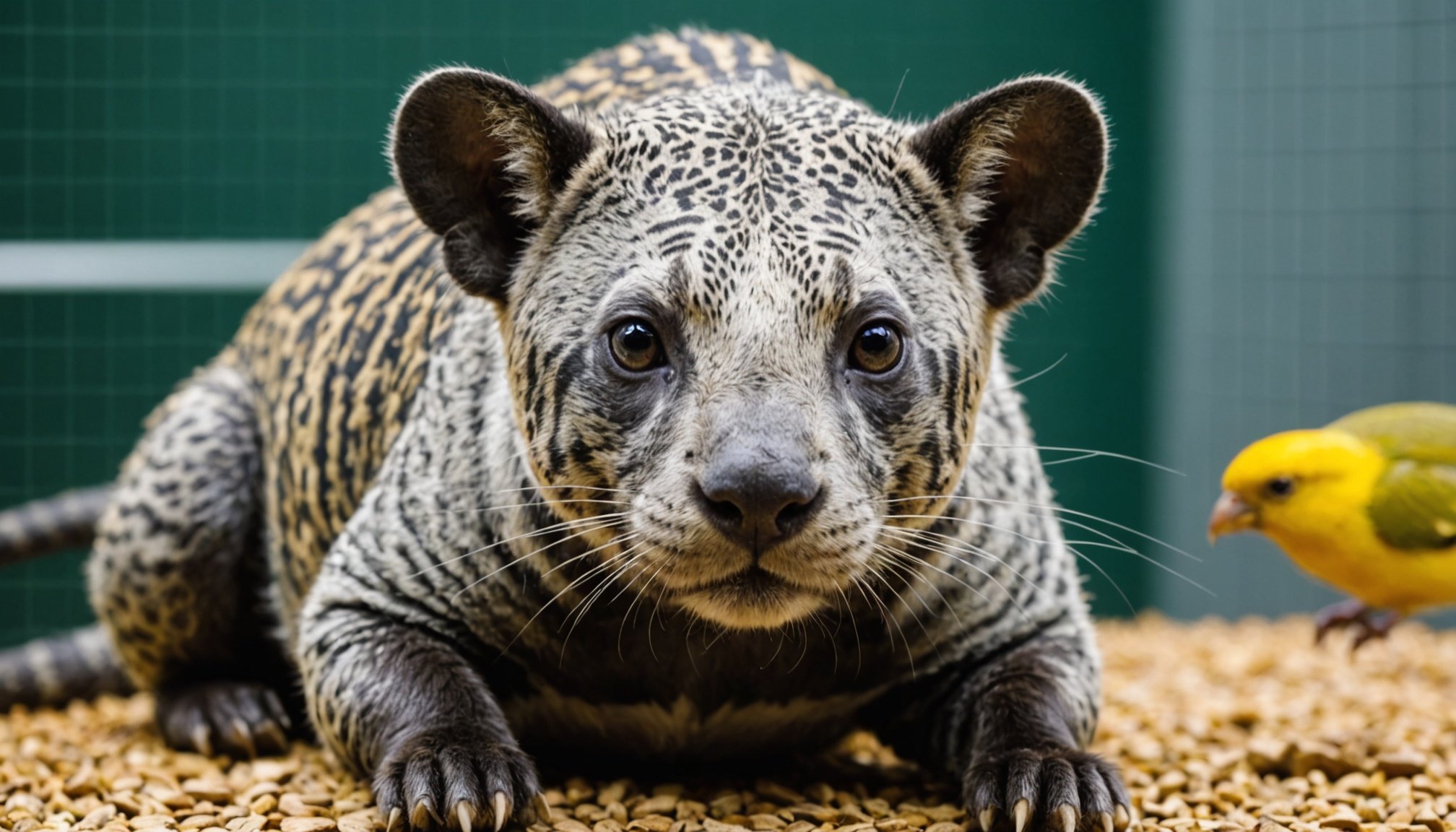Overview of Exotic Pet Health Challenges in the UK
Owning exotic pets has become a rising trend in the UK, posing unique challenges for veterinary practices. These imported animals often bring with them a variety of health issues. Owners and veterinary professionals alike must navigate these challenges to ensure the well-being of these pets.
Exotic pet health concerns frequently stem from diseases not typically encountered in domesticated animals. Imported animals might harbour exotic pathogens, sometimes leading to cross-species transmission. Veterinarians must adapt their practices to identify and treat such conditions, requiring both specialised knowledge and equipment.
Also to discover : Exploring the Cutting-Edge Innovations in Robotic Surgery for Gynecological Procedures: A Guide for UK Surgeons
Familiarity with imported animal diseases is crucial. Veterinary professionals in the UK face the task of diagnosing ailments that are novel to the region. For instance, reptiles can carry Salmonella, while birds might transmit Psittacosis. Such illnesses necessitate comprehensive health strategies, reinforcing the need for specialised care.
Understanding the legal framework surrounding the importation of exotic pets aids in managing these health challenges. Import rules are stringent, ensuring that diseases are not inadvertently brought into the country. Veterinarians should stay informed about legal parameters and health regulation protocols for effective practice and advisory roles. This awareness engenders responsible exotic pet ownership and optimises animal care.
In parallel : Exploring Holistic Strategies for UK Veterinarians in Treating Chronic Pet Conditions
Diagnostic Techniques for Imported Animal Diseases
Understanding diagnostic procedures for exotic animal health is crucial in maintaining overall welfare and managing potential disease diagnosis. Veterinary practices employ a variety of standard techniques to ensure accurate and efficient identification of conditions. Blood tests, imaging technologies, and molecular methods such as PCR and ELISA are commonly used to analyse the health status of exotic animals. These tools enable veterinarians to detect pathogens early, allowing for timely intervention.
Significance of Early Detection
Early detection plays a pivotal role in mitigating the impact of imported animal diseases. By identifying issues at an early stage, veterinarians can implement appropriate interventions, preventing outbreaks and preserving the animals’ health. This approach not only fosters better recovery outcomes but also reduces the risk of disease transmission to other animals or humans.
Case Studies: Successful Diagnosis
Several case studies illustrate the effectiveness of early detection and intervention. A notable instance involved the swift diagnosis of avian influenza in imported birds, where prompt laboratory diagnostics enabled containment and treatment, thus averting a potential epidemic. These real-world examples underscore the importance of integrating effective diagnostic techniques in routine veterinary practices. Employing comprehensive diagnostic strategies ensures a robust response to emerging health threats in exotic animal populations.
Treatment Strategies for Common Imported Diseases
Exotic animal care often involves treatment protocols tailored specifically for managing imported diseases. The challenges are multifaceted and require a nuanced understanding of various disease management strategies. Imported diseases, such as avian influenza in birds or exotic tick-borne diseases in reptiles, necessitate targeted interventions. Early detection is crucial, employing established treatment protocols to minimise the spread and ensure swift recovery.
In crafting these protocols, it is essential to consider the unique biology and needs of the species involved. For example, birds require different treatment strategies than reptiles due to differences in metabolism and immune response. Exotic animal care providers must remain informed about the latest research and updates in disease management. This continued education allows for the integration of new and effective treatments, improving outcomes for affected animals.
Advancements in treatment methodologies regularly emerge, often stemming from ongoing research in veterinary science. By staying abreast of these developments, veterinarians and caretakers can incorporate cutting-edge solutions into their care practices. This proactive approach not only benefits the individual animals but also contributes to broader public health objectives by curbing potential zoonotic threats.
Such dynamic and informed disease management practices ensure comprehensive and effective care for all exotic species.
Preventative Measures for Exotic Pet Health
Ensuring optimal exotic animal wellness demands a proactive approach, encompassing various preventative care strategies. When dealing with imported exotic pets, it’s vital to implement practical strategies for preventing diseases. These strategies often include maintaining hygiene, controlled diets, and habitat management tailored to mimic their natural environment. Such measures significantly reduce health risks and enhance the pet’s quality of life.
Owner education plays a crucial role in the successful implementation of health management practices. Understanding species-specific needs and compliance with recommended care routines can prevent many common ailments in exotic animals. Educational resources tailored for exotic pet owners provide valuable insights into optimal care techniques and emerging health concerns.
Vaccinations and regular health checks are indispensable components of exotic pet health management. Vaccines protect against various common diseases and, coupled with routine vet visits, establish a health baseline to detect and address issues promptly. This vigilance ensures that exotic pets remain vibrant and healthy throughout their lives.
Ultimately, emphasis on preventative care fosters healthier, happier pets and reduces long-term healthcare costs. Thus, a commitment to comprehensive health management and education significantly impacts overall exotic animal wellness.
Legal Regulations Impacting Exotic Pet Veterinary Practices
Navigating the veterinary regulations concerning exotic pets is crucial for both veterinarians and pet owners. In the UK, exotic pet import laws establish the legal framework for bringing non-native species into the country. These laws require strict certification to ensure the health and origin of exotic pets, which helps prevent the spread of diseases and protects native ecosystems. Compliance with these regulations is non-negotiable, demanding veterinarians remain updated on legal requirements to provide appropriate care.
The impact of these legal frameworks extends into veterinary practices, influencing both routine and specialised care for exotic pets. Veterinarians must be proficient in understanding the nuances of import documentation to ensure all treatments align with legal standards. Moreover, failure to comply with veterinary regulations may risk professional penalties or legal action, stressing the significance of legal proficiency in this field.
Challenges emerge as veterinarians grapple with balancing patient care and compliance. Compliance issues arise frequently, as regulations evolve, requiring constant vigilance and adaptation. Consequently, veterinarians must invest in continuous education and collaboration with legal experts. This dynamic landscape requires practitioners to be adept at navigating complex legal waters, ensuring ethical and lawful practice at all times.
Case Studies in Exotic Pet Health Management
Exploring real-life case studies offers valuable insights into the intricacies of managing the health of exotic pets. These analyses often highlight the unique challenges and solutions in veterinary best practices for non-traditional species.
A prominent case study involved a rare Amazonian parrot imported with signs of respiratory distress. The objective was to stabilise the parrot’s condition through tailored interventions, leading to its eventual recovery. Key outcomes from this intervention included an improved protocol for respiratory issues in parrots, enhancing future care. Another case focused on a rescued iguana suffering from malnutrition due to inadequate diet. Following a strategic feeding plan, the iguana recovered and exhibited normal activity levels. This case underlined the importance of dietary management in exotic animal care.
These experiences underscore essential lessons learned that refine exotic patient care. Veterinary teams can adopt these findings to adapt their techniques, ensuring better health outcomes for exotic pets. Continuous analysis of case studies remains crucial in overcoming challenges and promoting innovative solutions within veterinary practices. By integrating these learned strategies, the field of exotic pet health management is set to evolve, promising enhanced care for these unique animals.
Building Expertise and Resources for Veterinarians
Veterinary education plays a crucial role in enhancing professional growth, especially concerning exotic pet health. Continuous education and training are fundamental in ensuring veterinarians are equipped with the necessary skills to care for exotic animals. This is important as these animals often present unique challenges that differ significantly from more common species.
In the UK, numerous resources are available to support veterinarians focusing on exotic animal care. These resources include specialised courses, workshops, and online platforms that offer up-to-date information and insights into the latest veterinary practices. Such opportunities allow practitioners to stay current with the advancements in treatment techniques and healthcare innovations.
Encouraging collaboration and knowledge sharing among veterinary professionals is equally important. By engaging in discussions, participating in conferences, and being part of professional networks, veterinarians can gain valuable insights and practical advice from their peers. This collaborative approach not only enhances individual knowledge but also fosters a community of professionals committed to improving the standards of care for exotic animals.
Professional growth in the veterinary field is not just about acquiring knowledge, but also about applying it effectively. Veterinarians are urged to actively pursue these educational opportunities and connect with resources to ensure they provide the best possible care for all animal species.











